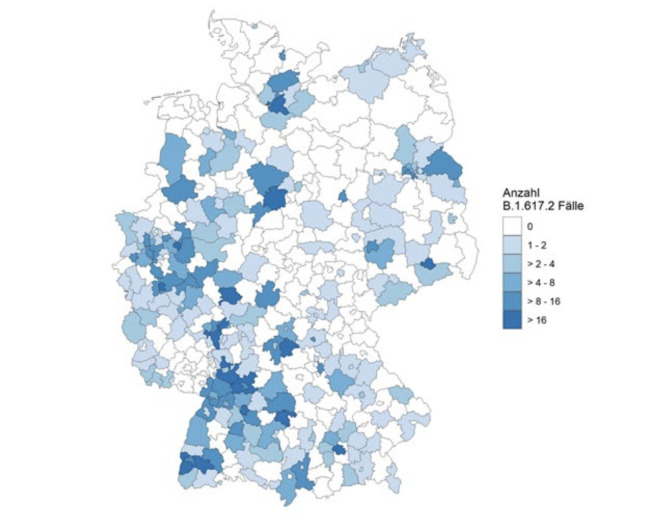What’s the latest?
Although Covid rates in Germany have been going down, the proportion of the Delta variant first detected in India (B.1.617.2) is growing significantly.
Analysis by the Robert Koch Institute (RKI) found the share of the Delta variant almost doubled within a week – and it now accounts for about 15 percent of new Covid infections nationwide.
READ ALSO: Share of Delta variant Covid cases in Germany almost doubles in a week
Chancellor Angela Merkel on Thursday said Europe needed to remain “vigilant”.
“In particular the newly arising variants, especially now the Delta variant, are a warning for us to continue to be careful,” said Merkel in the Bundestag.
Health Minister Jens Spahn (CDU) urged people to be cautious.
“I appeal to all travellers to inform themselves carefully about the incidence of infection, to accept test offers and to take the quarantine obligations seriously,” Spahn told the Handelsblatt newspaper.
Asked if people could book their vacations without worry despite the Delta variant, he said, “In principle, yes. However, it looks different for countries that are already heavily affected by the delta variant.” There, he said, the risk of contracting the virus and bringing it home is much higher. A vacation summer should not be followed by an “autumn of worry”, he said.
The tweet below by German data journalist Olaf Gersemann shows how the proportion of the Delta variant has increased in Germany, particularly in the last three weeks.
3/4
… Fallzahlen einhergeht, ist dagegen weiter offen. Bisher erscheint der seit Wochen bestehende Abwärtstrend intakt.
Zum Hintergrund noch einmal die gestern Abend vom RKI veröffentlichten Daten:
Es hat drei Wochen gedauert (von KW 18 bis KW 21), bis sich der … pic.twitter.com/8RvdMTnOcQ
— Olaf Gersemann (@OlafGersemann) June 24, 2021
Where are Delta infections happening?
The Alpha variant (B.1.1.7), which was discovered in the UK, still dominates the incidence of infection in Germany, but its share of positive cases in the sample has now shrunk to 74 percent after weeks of hovering around 90 percent. As before, the proportions of Beta (discovered in South Africa) and Gamma (discovered in Brazil), which are also variants of concern, are very low.
Delta has been detected in all German states in the past four weeks, RKI data shows. Information from the reporting system was available for around 1,440 cases during this period. The absolute number of weekly Delta cases has increased since the 21st calendar week (May 24th), from about 270 to about 470 in the 23rd reporting week.
The map below by the RKI represents the number of reported Delta cases (suspected or detected) per district transmitted to the RKI from around the end of May to mid-June.

As The Local has been reporting, some areas have detected a surge in Delta cases. In Hesse, it already accounts for more than 20 percent of new infections.
READ ALSO: ‘Vaccinate quickly’: German states see surge in Delta variant cases
According to the RKI, the majority of infections are taking place in Germany rather than connected to travel. Most transmissions have happened in private households, and there have also been larger outbreaks involving more than five people in workplaces and schools with up to 24 people.
The most frequently cited countries in connection with introductions from the Delta variant are Afghanistan (19 cases), Russia (16) and Italy (14).
About nine out of 10 people infected with Delta are under the age of 60, according to the report, and this age group accounts for 77 percent of hospitalisations.
Germany takes strict action against regions that are deemed ‘virus variant areas of concerns’, including the UK. Travel is banned from these countries except for residents and citizens.
However, Chancellor Merkel has spoken out against the patchwork of travel rules across EU countries.
She called on all countries to quarantine arrivals from the UK. Some countries, such as Spain, have no restrictions on people coming from the UK.
READ ALSO: Merkel wants to see all European countries quarantine UK arrivals
Is this a critical time?
Dortmund immunologist Carsten Watzl said this development doesn’t mean people should panic, but called for vigilance.
“The case numbers of Alpha (the dominating variant in Germany) are quite well-behaved and clearly declining, but those of Delta are rising slightly,” he told DPA.
As Delta still accounts for the much smaller share of infection incidence, there has been no overall rebound in infection rates so far, he said.
“We’re still in the balance. But it could be that this is a tipping point now,” Watzl added.
READ ALSO: Nearly a quarter of new Covid infections in Munich area ’caused by Delta variant’
There are fears that Germany will see a steep rise in cases like the current wave in the UK.
In the UK, Delta accounts for almost 90 percent of all new infections, even though about 60 percent of people there are already fully vaccinated, while 82.5 percent have had at least one initial dose.
Germany has fully jabbed about 33.5 percent of the population, and around 52.5 percent of people have been partially vaccinated.
Research shows that full vaccination provides high protection against the variant, but preliminary data suggests that Delta can infect people that have received only one dose.
The Our World in Data chart below shows the increasing infections in the UK compared to Germany’s downward trend.
If there are further relaxations of rules or if Delta is imported from abroad through travel opening up, the situation could worsen again, said Watzl, who is secretary general of the German Society for Immunology.
“The good thing is we (Germany) have a buffer, we are at a very low 7-day incidence,” he said.
EU health officials predicted on Wednesday that the Delta variant will make up 90 percent of all cases across the bloc by the end of August, and urged countries to fully vaccinate people as quickly as possible.



 Please whitelist us to continue reading.
Please whitelist us to continue reading.
Member comments